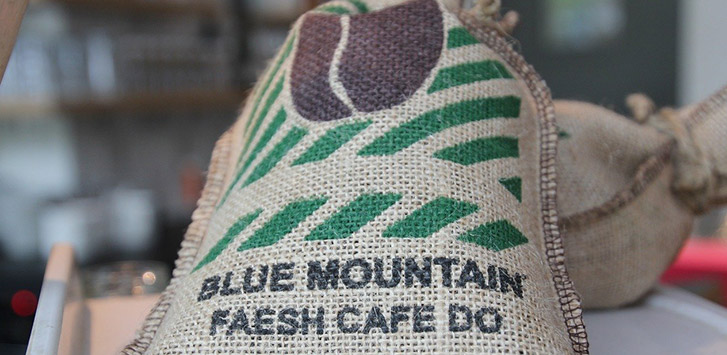
Jamaican coffee is one of the world’s greatest wonders. Introduced to Jamaica in 1728, Jamaican Blue Mountain coffee is best known for its mild flavor and general lack of bitterness, creating one of the most sought after and expensive beans in the world.
Jamaica’s blue mountain region is ideal for growing coffee. With an average elevation of 7,402 ft. and a cool, misty environment, coffee plants flourish. Rich soil filled with volcanic nutrients, nourished by regular rainfall, assist in shaping the gourmet flavor profiles of these coffee beans. For the most part, small landholdings and farms produce most of the crop.
History
Ironically, Jamaica’s highly sought-after coffee beans are not native to the island. In 1723, King Louis XV gifted three coffee plants to the French colony of Martinique, west of Jamaica. In 1728, Sir Nicholas Lawes, Governor of Jamaica, received a coffee plant from the colony.
Within nine years, the Jamaican government had begun exporting, becoming the largest producer from 1800-1840. Jamaican coffee exportation began its descent in 1838 when slavery was abolished throughout the United Kingdom and its colonies, as many plantations then shut down.
Also grown in the Caribbean, both Haiti and the Dominican Republic received coffee plants around the same time as Jamaica and followed a similar growth and exportation pattern. Haiti supplied half of the world’s coffee by 1788 but quickly fell in popularity, due to the Haitian Revolution in 1791, making room for the rise of Jamaica.
The coffee industry in Jamaica underwent another change in the 1950s when the Jamaican Coffee Industry Board (JCIB) instituted a Coffee Industry Regulation Act. The act defined which beans could be labeled as Blue Mountain and restricted the use of the Blue Mountain trademark to only those authorized by the JCIB. In general, Saint Andrew, Saint Thomas, Portland, and Saint Mary make up what is known as Blue Mountain coffee.
Since quality is of the utmost importance, the JCIB has created strict standards for growers to follow, including guidelines for growing, harvesting, and marketing these highly prized agricultural commodities
Coffee Production Today

Nowadays, the Jamaica Blue Mountain and Jamaica High Mountain Supreme Coffee Trademarks set the standards for Jamaican coffee. The mission of the Jamaican government, now, is to promote and regulate a fair and flourishing trade environment, while maintaining high-quality standards through monitoring the process from field to finished product.
In contrast, Jamaica’s neighboring coffee exporters, Haiti and the Dominican Republic are producing less coffee than Jamaica. Devastated by numerous natural disasters, Haiti is struggling with soil erosion, deforestation, floods, and droughts. To combat the effect of these natural disasters, Haiti has implemented fair trade policies, hoping to resurrect its coffee bean exportation. Meanwhile, the Dominican Republic continues to thrive, producing over 9,200 tons of coffee beans, annually.
Blue Mountain Trademark

Blue Mountain coffee is a globally protected certification trademark. These beans are certified by Jamaica Commodities Regulatory Authority (previously known as the JCIB). To be labeled as Jamaican Blue Mountain coffee, the coffee is grown at an altitude of 3,000 ft. to 5,000 ft. The other type of Jamaican coffee, Jamaica Supreme or Low Mountain, is grown below an altitude of 1,500 ft.
Flavor Profile
Jamaica Blue Mountain coffee comes in three numbers, ranging from the largest, most desired with the least defects (#1) to a smaller bean with more defects and less nuanced flavor (#3).
Jamaican coffee is predominantly Arabica Typica, which is superior to other Arabica varieties. To connoisseurs, Jamaica Blue Mountain is the champagne of coffees. Packaged in iconic, wooden barrels to preserve its flavor profile, this gourmet coffee stays true to its natural flavors.
Jamaica coffee boasts an exceptional sweetness and full body in a complex, yet well-balanced cup with hints of chocolate, and sweet herbal and floral notes, complete with a nutty overtone. The coffee is best known for its classic, yet mild, taste and silky-smooth texture. The bold aroma alone will convince you to try a cup, and the clean taste and lack of bitterness will keep you wanting more.
Roasting Suggestions
Roasting is one of the most important parts of making a good cup of coffee. Because of the delicate balance of nuanced flavors and lack of bitterness in these beans, Jamaican coffee beans are at their best with a medium roast or medium-dark roast. This allows the flavors and fragrances to shine without losing any of the quality of the coffee.
Brewing Methods
The best brewing methods for different types of coffee beans are the brewing methods that truly emphasize all the different flavors. In this case, a French press or pour-over are the best methods of brewing. Both allow adequate steeping time to draw out the flavors, while not increasing the acidity. Remember to pay attention to grind size before brewing, since the wrong grind size can change your entire experience.
Quick French Press tips:
- Use coarse grinds.
- Heat water until it’s just boiling.
- 2 Tbsp. ground coffee to 8 oz. water ratio.
- Steep for 4 minutes.
Quick Pour-Over tips:
- Use medium-coarse grinds.
- Heat water until it’s just boiling.
- Pour half of the water over the grounds in a circular motion, letting it sit for 30 – 45 seconds before pouring the other half.
Conclusion
Blue Mountain coffee beans are worth a try. One of the most sought-after coffees in the world, it truly delivers quality beans with a complex flavor profile that will satisfy even the connoisseurs of this world.